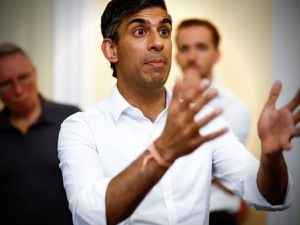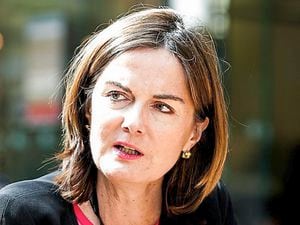What Rishi Sunak really believes, according to a Conservative philosopher
He wasn't Conservative members' first choice but Rishi Sunak is the new prime minister, and commentators now have the unenviable task of predicting what his government will do in office.

The problem is, it's almost impossible to tell.
Because his leadership election against Liz Truss was very much personality-driven as opposed to policy-focused, it's difficult to know if Mr Sunak has some kind of overarching belief system or not.
There's another reason why the ideology or philosophy guiding Sunak's regime might be hard to determine too, and the best person to dive into this murky topic is surely a Conservative philosopher.
"I don't think we have a clear idea as to what the next whole ideology is because Sunak hasn't been forced to develop one," said the University of Birmingham's Jake Scott.
"We are a party now that has been in government for 12 years, and we do not have a single coherent philosophy as a party at the moment.
"Margaret Thatcher was in government for 11 years and that was okay because it was one person. For better or for worse, that meant there was a coherency.
"Sunak will be the fifth Prime Minister in six years and that's absurd," he continued.
"That's partly the reason time in opposition is actually good for parties - it forces you to think about what you believe, and how you can sell that to the electorate."
The new PM hasn't said very much about how he might address the cost of living crisis, exacerbated by Liz Truss and Kwasi Kwarteng's disastrous mini-budget.
But he was chancellor for a while and certain things can be gleaned from what he did during the Boris Johnson era, especially during the Covid-19 pandemic.
This complicates things, though, because what Mr Sunak did as chancellor kind of contradicts his reputation.
The prime minister is known for being a committed balancer of books and that's what saw him hike the tax burden to its highest level for 70 years as chancellor.
It's been widely reported that he has a personal preference for lower taxes, but is unlikely to deviate from the u-turns set out by Jeremy Hunt on October 17, especially the increase in corporation tax.
He has in the past been verbally very unenthusiastic about large-scale spending commitments, saying in his first leadership bid that the Government needed to “return to traditional Conservative economic values” rather than “fairytales”.
However, Mr Sunak was elected on a manifesto produced under Boris Johnson in 2019, which included levelling up spending pledges, something Boris carried over from Theresa May's belief in the "good that government can do."
So will he spend or won't he? Jake thinks he might. "He clearly has an affinity with [Boris] Johnson," he said.
"Sure, he might have stabbed Johnson in the back, at least that's the feeling amongst some of the party membership...
"But it was Johnson who put him into the treasury in the first place.
"So I think Sunak's got a similar ideology to Johnson in that there needs to be some kind of regional levelling up," he continued.
"There is a sense amongst the developing right of the party that there is a good that government can do.
"This was a phrase that came from the 2017 general election manifesto, so it's Theresa May's phrase.
"Johnson and Theresa May are actually quite similar when it comes to this belief that there is a way of using the state to address problems in society.
"I think we can see Sunak's belief in that through the way he approached the Covid crisis as chancellor.
"The Furlough Scheme was an attempt to use the powers of the state to help people who would be vulnerable."
This means there's a chance Rishi Sunak will spend government money to help the most vulnerable during the cost of living crisis.
But because he's a fan of balancing the books, it won't be pain free.
For that reason, keeping some of Jeremy Hunt's pencilled-in austerity measures remains a realistic proposition, and state spending would probably mean tax rises.
It's also realistic to suggest he'll deploy other economic measures to help people. For example, as chancellor, he cut VAT on home insulation measures and during the leadership campaign said he would "embark on a programme of massive energy efficiency upgrades in people’s homes."
Liz Truss actively avoided discussing this kind of thing during her tenure because there's hefty cost attached and she differed from Sunak in that she attempted to be as anti-interventionist as possible.
"Sunak is not someone who is an economic egalitarian because he quite clearly believes in the power of the market in general," Jake explained.
"He's just prepared to be a bit more interventionist than say Truss was."
Sunak backs investment zones, one of which was possibly earmarked for the Black Country, and he supported lifting the fracking ban, providing it had local support. On this, he shares Truss' views but it's upset a lot of Tory MPs and Sunak really has no choice but to try and unite the party so might back down.
Another possible contradiction here is that during the leadership election, Sunak said he was committed to protecting the green belt and would stop local authorities attempting to release protected land for development.
This likely means the end of the Government’s 2019 manifesto commitment to build 300,000 homes a year, and calls into question any relaxing of planning rules as part of investment zones.
As previously mentioned, Jake Scott is a Conservative philosopher with the appropriate expertise to comment on Sunak. Overall, he believes that while the new PM is more interventionist than Liz Truss and probably a neoliberal, he isn't really guided by a genuine philosophy or ideology.
"I said this in 2016 after [David] Cameron stepped down," he said.
"The problem is now going to be that there's going to be a different leader who's never had to develop their own philosophy.
Sunak is several degrees of detachment from that problem, but it's a problem that gets worse by degrees, it doesn't diminish," he continued.
"I can't really can't believe that in 12 years we've had five prime ministers, that is stunningly absurd.
"Sunak has never had to sell his vision of conservatism to the country, so I'm not calling for a general election, but there is going to be a problem now of actually trying to work out what he stands for."
"If there's something that we can deduce from from his economics, it's that he believes that the state can be used to protect vulnerable people.
"Whether or not it does is a different question".





